
Kozukenosuke (Tadamasa) Oguri (1827-1868)

<The Japanese Mission at Washington Naval Shipyard on April 5, 1860: The second from right of the front row is Kozukenosuke Oguri.>
Kozukenosuke (Tadamasa) Oguri was born in 1827 into the samurai family of the "Hatamoto" rank under the Tokugawa Shogunate. In 1860, at the age of 34, Oguri was handpicked by Senior Minister Ii to travel to the United States of America as a member of a Japanese diplomatic mission to ratify the Japan-US Treaty of Friendship and Commerce. They set sail for America on the US naval ship Powhatan and then traveled around the world before returning to Japan. He subsequently spent the next 8 years assisting the Shogunate government in the course of which, he helped push forward Japan's modernization program. Some of his achievements* are as follows:
■ Construction of the Yokosuka shipyard
■ Establishment of Japan’s first French language school (Yokohama)
■ Adoption of French military system and training under it
■ Development of the Iron Ore Mines (Shimonita town, Gunma prefecture)
■ Establishment of the First Japanese Corporation (Hyogo Shosha)
□ Advocacy of the use of Gas Lamps
□ Revamp of the financial markets by issuance of Golden Labels etc.
□ Advocacy of the Prefectural System
■ Advocacy of the Conservation of Forests
□ Advocacy of the establishment of a train line between Edo (present-day Tokyo) & Yokohama
□ Advocated the publishing of a Newspaper
□ Advocacy of the establishment of a Postal System
(* A Japanese writer, Ryotaro Shiba, praised Oguri for his achievements that greatly contributed to the modernization of Japan. He called Oguri "The Father of Meiji Era of Japan" in his work, "A Nation called Meiji.")
In March 1868, Oguri obtained permission from the Shogunate Government to return to his fief (territory) in Gonda Village, Gunma Prefecture. He stayed temporarily at the Tozenji Temple while constructing his house on Kan-non-yama Mountain. Sixty five days later on April 6 1868, Oguri was beheaded along with 3 other retainers on a river bed in Mizunuma Kawara by the armies of the new Meiji Government. On April 7, Oguri's adopted son Mataichi and three other retainers were beheaded inside the Takasaki Castle (Gunma Prefecture)
Link to English sites:
Who is Kozukenosuke Tadamasa Oguri (Yokosuka city)
Verny and Oguri Memorial Ceremony (Yokosuka city)
Historique de Yokosuka (French/link = brest city)
The 1860 Japanese Embassy to America (Consulate General of Japan in New York)
Bridge of Hope -The Road Traveled by Japanese-Americans(book)
The three ships that brought the First Official Japanese Ambassadorial Delegation to the United States
Tozenji (Zen) Temple & Kurabuchi Village
| ● Friends from Brisbane, Australia, who stayed in Kurabuchi オーストラリアからのお客様 倉渕村にホームステイ |
倉渕村に

| <If you see any garbled letters on Windows in English, they are Japanese letters which can be read only on Windows with Japanese fonts.> |
|---|
|
◆2005年9月、倉渕村にオーストラリア・ブリスベーン市からのお客様がホームスティしました。 Friends from Brisbane, Australia, stayed with some families in Kurabuchi Village in September 2005. ◆東善寺には、イヴ先生とジェニナ先生という二人の女性教師が泊まり、日本の田舎の生活を体験しました。ほかに生徒5人先生3人で計10人。 Two teachers, Ms. Eve and Ms. Janina, stayed at Tozenji and enjoyed countryside lives in Japan. There were ten people from Australia in total, five teachers and five students, who stayed in the village this time. ◆イヴ先生は熱心に日本語を学んでいて、セントジョセフ学園で日本語を教えています。今回はわが家へ三度目の滞在となります。 Ms. Eve has been studying Japanese for many years and is now teaching the language at St. Joseph's School in Brisbane. This was her third stay at Tozenji. ◆ジャニナ先生は、共産主義を嫌って30数年前にポーランドから移住したということで、はじめは英語を学ぶのにたいへん苦労したと語っていました。 Ms. Janina despised communism and immigrated to Australia from Poland about 30 years ago. In the beginning, she really had hard time in leaning English. |
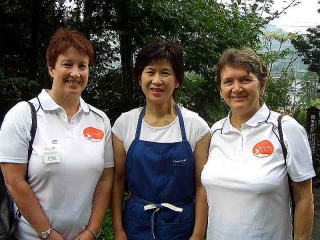 |
 |
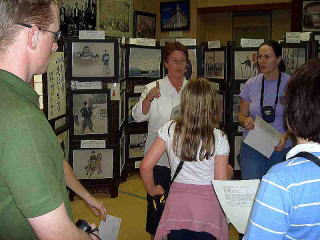 |
| イヴ・晴美・ジェニナ 12日〜20日まで滞在です。どうぞよろしく。 (Left to right) Eve, Harumi (housewife at Tozenji), Janina: They were going to stay at Tozenji from Sep. 12th till 20th. |
倉渕中学の生徒もたびたびオーストラリアを訪れていますので、村の小中学校を見学して授業に参加したり、村内や県内を見物するなかで、東善寺にも来て小栗上野介を学び、坐禅もちょっとしてゆきました。 Kurabuchi village and the Australian friends have long friendship. The students of the Kurabuchi Junior High School have visited Australia several times. S in the village this time, the Australian friends visited the primary and junior high schools in the village and took part in the classes. They also visited many other places in the village and all over Gunma prefecture. When they stayed at Tozenji, they learned about Oguri Kozukenosuke, the great samurai at the end of the Tokugawa Shogunate Era, and experienced Zen meditation. |
|
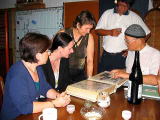 |
 |
 |
| 住職のヒマラヤ登山のアルバムを見ました They enjoyed the pictures of the priest's mountaineering in the Himalayas. |
役場の熊も、村長さん(右から二人目)も歓迎してくれました。 They were welcomed by the village mayor (2nd from the right) and the bear statue at the village office. |
大きなダルマさんの絵の前でお茶を飲みました。 |
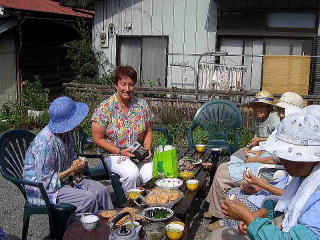 |
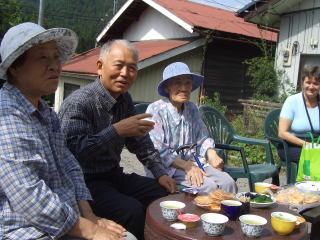 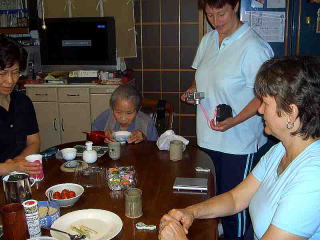 |
|
| 門前お茶の会で近所のおばあさんたちとおしゃべりし、わが家で老母と語り、ゆったりした時間が楽しかったようです。 The Australian friends chatted with seniors in the village at a weekly tea party in front of Tozenji. They also talked to Bun, grand-ma at Tozenji: They really enjoyed time with the villagers. |
||
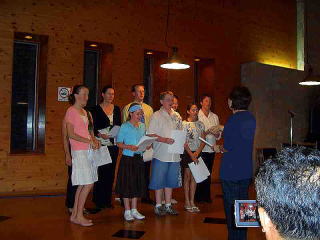 |
 |
 |
| 19日夜ははまゆう山荘でお別れパーティーです。たのしい歌やダンスを披露してくれました。ハッピは村からのプレゼント。 We had a farewell party at Hamayu Sanso, a mountain cottage, on the evening of Sep. 19th. It was a wonderful time with Australian songs and dances. The Australian friends danced wearing "happi" coats that were gifts for them from the villagers. |
||
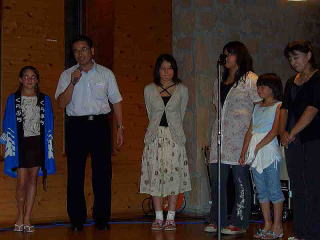 |
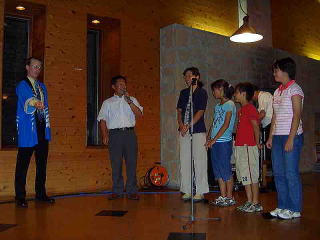 |
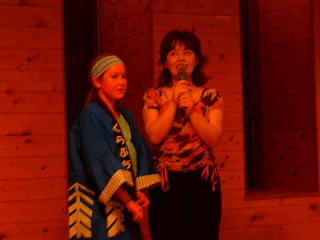 |
| ホストファミリーとゲストが互いにメッセージを交わします。ゲストを迎えたことで、それぞれが心を開くことの大切さを学んだ、それがホームスティのいちばんの成果でしょう。 Host families and the Australian friends exchanged farewell messages. It was a great experience for the villagers to have the Australian friends and to know other cultures. That must be the most important thing we have leaned from the friendship. |
||
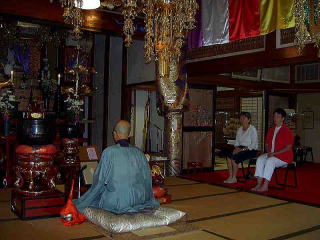 |
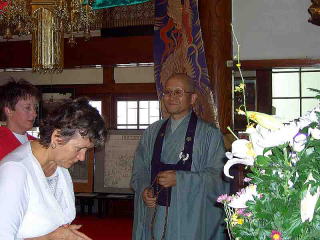 |
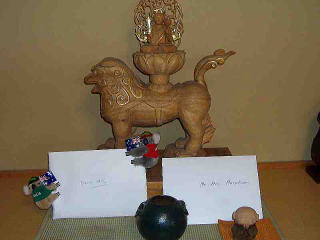 |
| お別れの朝 本堂で一行の旅の安全を祈って読経し、お焼香をしてもらう。あとに、二人からの御礼のメッセージがそっと残されていました。 On the morning of their departure, the priest recited a sutra praying their safety on the way home. Ms. Eve and Ms. Janina burned incense. After they departed, the priest found a messages of thanks from the teachers in front of a Buddhism statue. "See you again." |
||
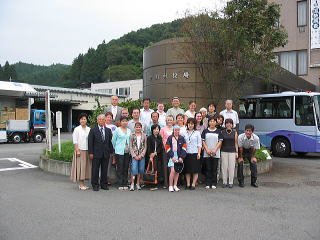 |
 |
|
| さようなら お元気で…、 また会いましょう Sayonara and see you again!! |
帰国の途中で寄った国技館の相撲。大きな身体に驚きました! They saw the Sumo Tournament at Kokugikan just before their departure for Australia. The sport was a big surprise to them in many ways. |
|